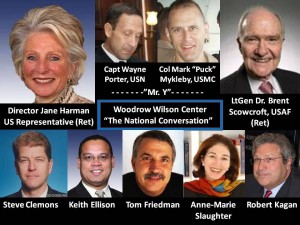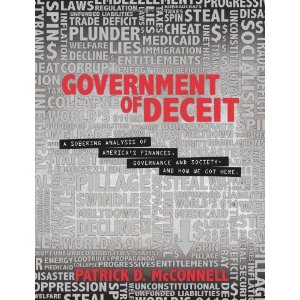
“The National Conversation” Debuts
The Woodrow Wilson International Center for Scholars has announced a new initiative launching April 8, 2011: The National Conversation at the Woodrow Wilson Center. The National Conversation will examine overarching themes of U.S. international and domestic policy, drawing on high-profile guests and experts from all sides of the political sphere to provide thoughtful, intelligent explorations of challenging issues with the goal of informing the national public policy debate.
From uprisings in the Arab world to troubled economies around the globe, challenges to America’s role in the global community have seldom been greater or more complex. And with economic woes at home and our military capacity stretched thin through involvement in Afghanistan, Iraq, and Libya, many are left wondering about our ability to respond and adapt to a rapidly changing world. At a time when national unity around a shared vision is lacking, there is a growing belief that a new national security narrative must emerge that defines the role of the U.S. in global affairs for a new century. But can we achieve such a national consensus in this era of hyper-partisanship? A possible answer comes in the form of an anonymous “white paper.” Two US military officers have written an essay describing a vision for the missing narrative under the authorship of “Mr. Y.” Join our panel as it discusses the ideas contained in this provocative paper from an unexpected source. Is this the blueprint for the narrative we seek?
The inaugural National Conversation kicks off April 8 from 12:00 to 1:30 p.m., with a discussion on the search for a new national security narrative to guide U.S. policy in the 21st Century. Five panelists will participate in a discussion moderated by award-winning New York Times columnist and author Thomas Friedman. The panel will feature: Steve Clemons, founder of the American Strategy Program at the New America Foundation; Representative Keith Ellison (D-MN), the first Muslim American to be elected into the U.S. Congress; Robert Kagan, senior fellow for foreign policy at the Brookings Institution; Brent Scowcroft, U.S. national security adviser to President Ford and President H.W. Bush; and Professor Anne Marie Slaughter, former director for policy planning for the U.S. Department of State and current Bert G. Kerstetter '66 University Professor of Politics and International Affairs at Princeton University.
Watch Video of the Event (Permanent URL)
Note: Robert Steele invited comment starts at 01:15:12
Download “A National Strategic Narrative,” By Mr. Y (15 Page PDF)
Strategic Analytic Model from Earth Intelligence Network
Trip Report & Selected Links with Graphics Below the Line




 Friday, April 1, 2011 – Foreign Policy
Friday, April 1, 2011 – Foreign Policy



